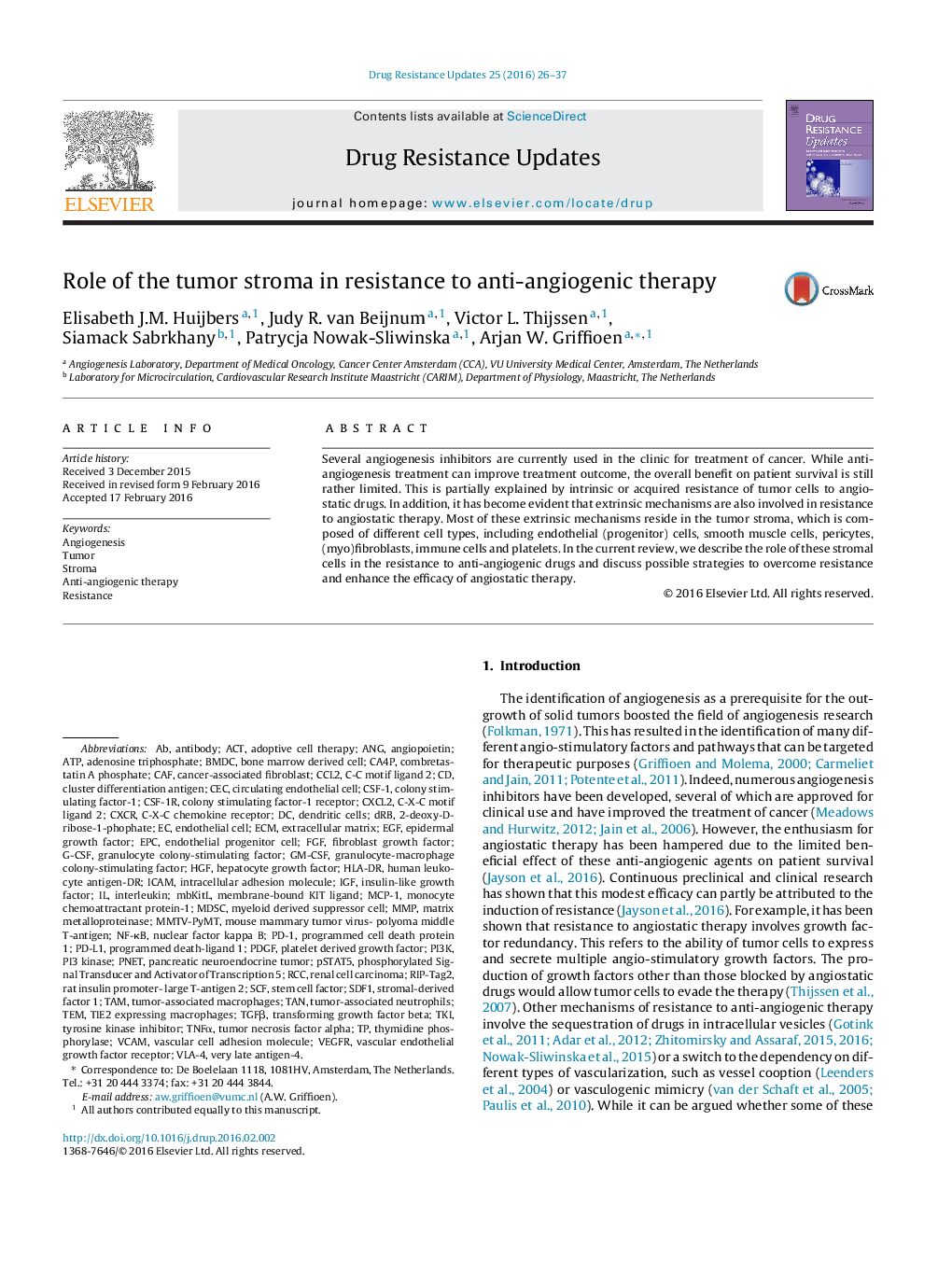| Article ID | Journal | Published Year | Pages | File Type |
|---|---|---|---|---|
| 8436718 | Drug Resistance Updates | 2016 | 12 Pages |
Abstract
Several angiogenesis inhibitors are currently used in the clinic for treatment of cancer. While anti-angiogenesis treatment can improve treatment outcome, the overall benefit on patient survival is still rather limited. This is partially explained by intrinsic or acquired resistance of tumor cells to angiostatic drugs. In addition, it has become evident that extrinsic mechanisms are also involved in resistance to angiostatic therapy. Most of these extrinsic mechanisms reside in the tumor stroma, which is composed of different cell types, including endothelial (progenitor) cells, smooth muscle cells, pericytes, (myo)fibroblasts, immune cells and platelets. In the current review, we describe the role of these stromal cells in the resistance to anti-angiogenic drugs and discuss possible strategies to overcome resistance and enhance the efficacy of angiostatic therapy.
Keywords
MCP-1EPCPD-L1VLA-4VEGFRTKITGFβHGFFGFCECACTECMTANRCCVCAMDRBICAMPNETHLA-DRGM-CSFPDGFSCFSDF1MMTV-PyMTNF-κBCAFPI3KC-X-C chemokine receptorMMPCA4PEGFCSF-1Rcolony stimulating factor-1CSF-1TNFαhuman leukocyte antigen-DRBMDCCCL2IGFCXCRMDSCCXCL2PD-1PI3 kinaseAdenosine TriphosphateATPangiopoietinAngiogenesisStromaAngTeminterleukinTAMTransforming Growth Factor BetaTumorPancreatic neuroendocrine tumortumor necrosis factor alphaThymidine phosphorylasevery late antigen-4Anti-angiogenic therapyadoptive cell therapyCirculating endothelial cellEndothelial cellDendritic cellsmyeloid derived suppressor cellEndothelial progenitor cellepidermal growth factorHepatocyte growth factorStromal-derived factor 1granulocyte-macrophage colony-stimulating factorgranulocyte colony-stimulating factorplatelet derived growth factorfibroblast growth factorInsulin-like growth factorStem Cell FactorG-CSFnuclear factor kappa Bcancer-associated fibroblastExtracellular matrixmatrix metalloproteinaseTumor-associated macrophagesprogrammed death-ligand 1ResistanceTyrosine kinase inhibitorintracellular adhesion moleculevascular cell adhesion moleculeTumor-associated neutrophilsAntibodymonocyte chemoattractant protein-1programmed cell death protein 1Renal cell carcinomacolony stimulating factor-1 receptorvascular endothelial growth factor receptor
Related Topics
Life Sciences
Biochemistry, Genetics and Molecular Biology
Cancer Research
Authors
Elisabeth J.M. Huijbers, Judy R. van Beijnum, Victor L. Thijssen, Siamack Sabrkhany, Patrycja Nowak-Sliwinska, Arjan W. Griffioen,
